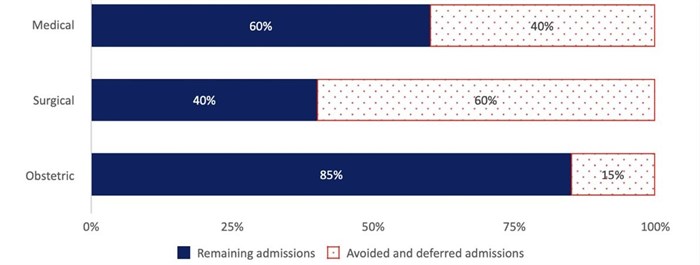Pandemic brings out interesting hospital admission trends

The interventions aimed at mitigating the impact of Covid-19 have already had a dramatic effect on hospital admission rates. These effects can change the way medical schemes approach the management of hospital admissions after the pandemic, the way that medical schemes plan to fund the cost of the pandemic and the way that medical schemes manage affordability constraints.
Many hospitals have temporary suspended elective admissions in order to minimise the risk of spreading Covid-19 and build spare capacity for virus patients. Patients too are wary of being hospitalised unless deemed absolutely necessary.
Dramatic reduction in admissions
We have seen a dramatic reduction in hospital admission rates, in the order of 50% across admission types, across medical schemes.
The admission rate for surgical cases has declined by more than 60%. Many types of surgery and theatre-based investigation are elective and can be delayed. For example, cataract procedures and diagnostic scopes are amongst the most common surgical procedures and both can often be deferred.
The admission rate for medical cases has declined by more than 40%. This is more surprising as medical admissions are not typically elective and admissions cannot usually be delayed. For example, one does not choose to develop a pneumonia or gastroenteritis that is severe enough to necessitate an admission.
This suggests either that there is some surplus demand for medical admissions that could be mitigated with proper intervention or that necessary care is currently being forgone.
In the case of the former, care systems could be better designed to minimise superfluous admissions. This would require the reorganisation of healthcare providers into patient-centred teams with aligned reimbursement models. Certain managed care techniques would also need to be reconsidered.

If care is being forgone due to Covid-19 and the lockdown, we could expect health outcomes to deteriorate. Mortality rates and other adverse outcomes may rise. There is a risk that patients delay seeking care for too long and only engage the health system when their conditions are more severe.
The more than 50% decline in the hospital admission rate will save medical schemes more than R1bn a week for so long as the trend is sustained. Over the five-week lockdown period savings will exceed R5bn.
Utilising the surplus
This raises the question as to how these funds should be utilised in these extraordinary times. The more conservative among us might suggest that funds should be used to build reserves in preparation for the full force of Covid-19 or to facilitate temporary financial relief for members.
A less obvious but more proactive approach would be to directly capacitate the public and private healthcare sectors in the interest of members.
Conservatively, R5bn could fund the production of more than 20,000 ventilators, which could cater to the needs of more than 400,000 infected patients. and countless pieces of personal protection equipment.
Perhaps, all these approaches should be pursed but to varying degrees. Funds should be directed towards the building of reserves, facilitating temporary financial relief for members and the procurement of vital healthcare equipment. In this way, schemes can play their part in combatting Covd-19.



































